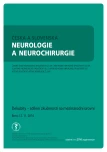Editorial
Vyšlo v časopise:
Cesk Slov Neurol N 2016; 79/112(Supplementum1): 7
Kategorie:
Editorial
International collaboration is essential for pressure ulcer management
Pressure ulcers are one of the biggest patient safety challenges facing healthcare worldwide. They have a major negative effect on the patient’s quality of life and health, are associated with increased morbidity and mortality, and generate considerable costs [1 – 3]. Prevalence rates of up to 72.5% have been reported, with large variations between countries and clinical setting [4]. Despite quality improvement initiatives, non-adherence to pressure ulcer guidelines is widespread. Studies have shown that only 10% of patients at risk received fully adequate prevention [5,6], while 70% of patients who were not at risk received some pressure ulcer prevention [6].
Effective pressure ulcer prevention and treatment is requires sharing information and collaboration. Not only within health care teams [7,8] and between health care teams and patients/ carers [7], but also in research and policy.
That is why the conference on pressure ulcers in the Czech Republic is spot on. This conference is an excellent example of sharing knowledge and expertise at an international level. Speakers from all continents but also from all healthcare disciplines will present on a variety of topics related to pressure ulcer prevention and treatment. Presentations on incontinence associated dermatitis, nutrition, surgical debridement and pressure mapping show that clinical topics are relevant across borders. But also presentations and discussions about monitoring, policymaking and implementation at a national level are relevant in every country and at international level. The European Pressure Ulcer Advisory Panel (EPUAP) is therefore proud to support this national conference. On behalf of the EPUAP, I wish the organisers, speakers and all the attendants an exciting and inspiring day and look forward to future collaboration.
prof. Lisette Schoonhoven, PhD
president of the European Pressure Ulcer Adv
Zdroje
1. Gorecki C, Nixon J, Madill A, et al. What influences the impact of pressure ulcers on health-related quality of life? A qualitative patient-focused exploration of contributory factors. J Tissue Viability, 2012;21(1):3 – 12. doi: 10.1016/ j.jtv.2011.11.001.
2. Demarre L, Van Lancker A, Van Hecke A, et al. The cost of prevention and treatment of pressure ulcers: a systematic review. Int J Nurs Stud 2015;52(11):1754 – 74. doi: 10.1016/ j.ijnurstu.2015.06.006.
3. Thomas DR, Goode PS, Tarquine PH, et al. Hospital-acquired pressure ulcers and risk of death. J Am Geriatr Soc 1996;44(12):1435 – 40.
4. National Pressure Ulcer Advisory Panel. Prevention and Treatment of Pressure Ulcers: Clinical Practice Guideline 2014.
5. Vanderwee K, Defloor T, Beeckman D, et al. Assessing the adequacy of pressure ulcer prevention in hospitals: a nationwide prevalence survey. BMJ Qual Saf 2011;20(3):260 – 7. doi: 10.1136/ bmjqs.2010.043125.
6. Vanderwee K, Clark M, Dealey C, et al. Pressure ulcer prevalence in Europe: a pilot study. J Eval Clin Pract 2007;13(2):227 – 35.
7. Pinkney L, Nixon J, Wilson L, et al. Why do patients develop severe pressure ulcers? A retrospective case study. BMJ Open 2014;4(1):e004303. doi: 10.1136/ bmjopen-2013-004303.
8. Spilsbury K, Nelson A, Cullum N, et al. Pressure ulcers and their treatment and effects on quality of life: hospital inpatient perspectives. J Adv Nurs 2007;57(5):494 – 504.
Štítky
Dětská neurologie Neurochirurgie NeurologieČlánek vyšel v časopise
Česká a slovenská neurologie a neurochirurgie

2016 Číslo Supplementum1
-
Všechny články tohoto čísla
- Význam tlakové mapy (pressure mapping system) pro pacienty s mobilitou na vozíku
- Mezinárodní spolupráce v oblasti prevence a léčby dekubitů jako výzva s ohledem na nedostatek národních registrů
- Význam a možnosti chirurgického débridementu dekubitů
- Inkontinenční dermatitida – současné poznatky o etiologii, diagnóze a prevenci
- Sorrorigenní rány, jejich identifikace a průběh péče
- Decubitus as a Cause of Death even in the 21st Century
- Hodnocení vybraných mezinárodních klinických doporučených postupů v managementu dekubitů (nástroj AGREE II)
- Implementace klinických doporučení – kde začít?
- Editorial
- Sledování dekubitálních lézí u pacientů s neurologickým onemocněním – analýza Národního registru hospitalizovaných
- Česká a slovenská neurologie a neurochirurgie
- Archiv čísel
- Aktuální číslo
- Informace o časopisu
Nejčtenější v tomto čísle
- Sorrorigenní rány, jejich identifikace a průběh péče
- Inkontinenční dermatitida – současné poznatky o etiologii, diagnóze a prevenci
- Význam a možnosti chirurgického débridementu dekubitů
- Význam tlakové mapy (pressure mapping system) pro pacienty s mobilitou na vozíku
